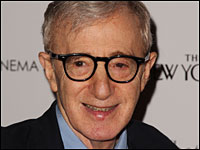 I’ve always loved Woody Allen’s movies. Not all of them equally, of course, but most of them are at least amusing, and some are true masterpieces. Annie Hall, of course, the one that won the Academy Award for Best Picture (1977), is at the top of the list. My other favourites are Hannah and Her Sisters, Manhattan, and Play It Again, Sam.
I’ve always loved Woody Allen’s movies. Not all of them equally, of course, but most of them are at least amusing, and some are true masterpieces. Annie Hall, of course, the one that won the Academy Award for Best Picture (1977), is at the top of the list. My other favourites are Hannah and Her Sisters, Manhattan, and Play It Again, Sam.
Mr Allen has a new movie out, called Whatever Works, and Terry Gross recently interviewed him on her radio show, Fresh Air.
His movies, almost all of them, display a depressed angst, a kind of existential difficulty that’s hard for some to take. As he points out, his movies aren’t autobiographical... and yet they certainly reflect the man’s own philosophy and internal troubles.
Here’s a transcript from 6:38 into the audio:
Terry Gross: So, may I ask, what are some of the real problems that making movies distracts you from?Woody Allen: Well, they distract me from the same problems that you face, or that anyone faces. You know, the uncertainty of life, and inevitability of aging, and death, and death of loved ones, and mass killings and starvations, and holocausts and... not just the man-made carnage, but the existential position that you’re in, you know, being in a world where you have no idea what’s going on, why you’re here, or what possible meaning your life can have, and the conclusion that you come to after a while that there is really no meaning to it, it’s just a random, meaningless event. These are pretty depressing thoughts, and if you spend much time thinking about them, not only can’t you resolve them, but you sit frozen in your seat, you can’t even get up to have your lunch.
Wow.
Indeed, should one so internalize the struggle to find meaning, and collect all the troubles of the word under one’s hat, one might indeed find oneself unable to function. For most of us, though, it doesn’t come to that.
Because Mr Allen really does have it there, in what he says: there is really no meaning to our individual lives. The are, indeed, just random, meaningless events, from a cosmic point of view. From a universal vantage point, our meaning, our purpose, is to be part of the life-cycle of the Earth. There’s no more nor less to it.
Of course, that doesn’t mean our lives need to be meaningless, purposeless, pointless.And then, one day a very unusual thing happened in the village: a little baby boy was born. A boy named Oblio. Now, don’t get the wrong idea: the being born part wasn’t unusual. Little kids were being born all the time in that village. What was unusual was that Oblio, unlike any of the other babies born that day, or any other day, had no point! He had no point at all.
Woody Allen responds to his existential angst by “distracting” himself with filmmaking. All the things he has to deal with in that endeavour, he says, leave no time to think about the disturbing stuff. But, really, can anyone but him say that filmmaking is, for Mr Allen, a distraction? Surely, it’s his purpose. He entertains us with his films, and he has a fulfilling life from that. Filmmaking is Woody Allen’s meaning.
It’s not, though, a meaning imposed from on high. It’s one he has developed himself. In looking for a meaning, he’s found one, or created one for himself. In lamenting the meaninglessness of life, and its randomness, he’s made his less random and more meaningful.
And so it is with us all. We all fulfill our natural purpose, the cycle-of-life part. But we each make our own “higher purpose” in what we do while we’re in that cycle.How is it we are here, on this path we walk?
In this world of pointless fear, filled with empty talk— Michael Pinder
The three famous people who died last week, Ed McMahon, Farrah Fawcett, and Michael Jackson, made it their purpose, as does Mr Allen, to entertain. Some decide their purpose is to help people, and they become teachers, firefighters, and physicians. Some lead, some provide services, some make things that others use; those are their meanings. For me, it’s my work with computers and the Internet. Our natural “purpose” provides us with the intelligence to develop our own, individual meanings of life.
And that’s the point.






3 comments:
Wow! I was thinking of writing a post on the non-meaninglessness of life and that some people seem to drive themselves crazy because they don't know what "their purpose" is but you've put it much more eloquently.
Thanks for quoting Michael Pinder, one of my favorites of the Moody Blues (along with Ray Parker). When he left the band after their Octave album, their quality suffered (in my opinion). He struck me as being a sort of "spacey" philosopher with his lyrics. My favorite songs of his are "One Step Into the Light" from Octave and "Out and In" (a collaboration with John Lodge) from Our Children's Children's Children.
Whoops, I mean Ray Thomas, not Ray Parker!
Post a Comment